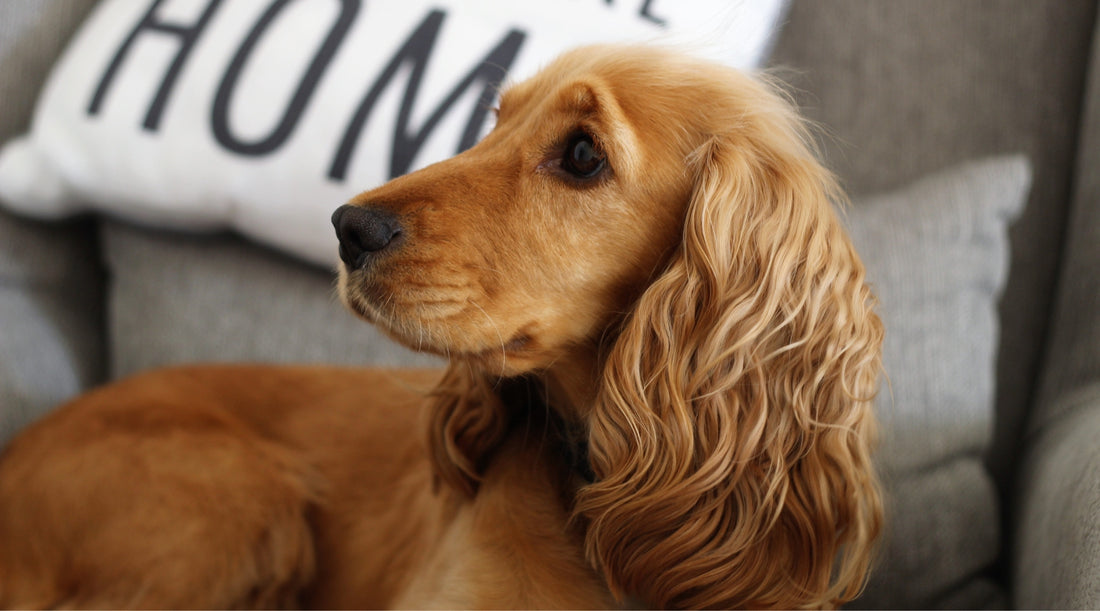
What is the point of doing gundog training with my pet dog if I don’t want to take them on a shoot?
On average, 50% of all annual Kennel Club puppy registrations are gundog breeds.
More gundog puppies will also be born and unregistered, and more still will fall into the crossbreed categories like cockapoo and labradoodle.
That’s a lot of dogs.
Gundogs have been bred for hunting, flushing, and retrieving game. They share many common attributes, such as the instincts to hunt, chase, and capture prey.
Over the decades, they have also been bred for their sociability, friendliness, intelligence and trainability (biddable nature). These traits have made them extremely attractive and desirable for families.
And so, a large proportion of the gundog puppies born into the world every year head off to family homes, destined to be pet gundogs with no expectation of working in the shooting field.
Now, there is no doubt that gundogs do make excellent pets.
All my working dogs are pets first. They live in my home and sleep while I work, they stay close to me on our daily walks, and would be just as happy to join me at the pub and on a trip to the beach as they would on a shoot day.
But this is because their in-built, genetic “gundog” needs are being met.
There is no shame in wanting to own a gundog breed while having absolutely no desire or intention to work them on a shoot.
But there is a growing danger that more and more ‘working line’ dogs are missing out on vital opportunities to do what they were bred to do as they end up in pet homes with owners who don’t realise the importance of gundog training even for non-working dogs.
In this blog, we will explore the implications of not doing gundog training, the benefits of breed-specific training and what ‘hobby’ gundog training involves for beginners.

What are the problems with having gundogs as pets?
You might have bought your pet Labrador, Golden Retriever, Spaniel, or Vizsla with the expectation that they will simply fit into your everyday life like any other breed of dog.
Before they arrived, you might have imagined them sleeping next to you while you work from home, having a leisurely stroll on your daily dog walk, or inviting them to accompany you on trips to the local dog-friendly pub and days out to the beach.
What you’ve got instead is a ball of chaos and energy that struggles to settle anywhere, let alone somewhere exciting like a busy pub.
A hunting machine that pulls you from scent to scent on what has now become known as the daily drag.
A dog you don’t trust off-lead in the local park or countryside because you’re never sure if they will come back when you call them.
Indeed, owners who are uninitiated to a gundog’s way of thinking and naive to their hunting prowess do struggle to teach reliable recall and loose lead walking or heelwork in the presence of distractions such as wildlife and scent.
We all remember the desperate cries of Fenton’s owner as his Labrador failed to recall, choosing to chase deer through Richmond Park instead.
But on top of that, with no outlet for their innate desires to hunt, chase, and retrieve, pet gundogs are more susceptible to developing lasting and damaging behavioural problems.
Sadly, I have seen it all: resource guarding, constant frustration barking, obsessive shadow or tail chasing, destructive chewing, and general over-arousal and over-excitement.

Why pet gundog problems can’t be solved with more exercise.
Many pet gundog owners think that they can simply tire their dogs out by giving them plenty of exercise.
However, allowing a gundog breed to free run for two or three hours a day is a recipe for disaster.
Gundogs were bred to work all day, week in, week out, during the shooting season. More exercise will only help to improve their fitness level and will create an athlete.
What’s more, letting them off the lead to go “self-employed” and do whatever they want repeatedly teaches them to disengage from you when out and about. No wonder they don’t want to stay close or come back to their “boring” human when called.
Similar problems also occur when owners focus only on the retrieve e.g., throwing an endless number of balls for their pet gundog in the park.
Yes, the dog is more likely to want to be with you (well, your ball), but it will still be getting fitter every day, and you will soon create a “wired”, adrenaline-filled, ball-obsessed dog.
As long as they are getting plenty of mental stimulation and brain work (such as short daily training sessions), our gundog breeds only need 20 to 30 minutes of exercise per day.
Even those pet gundogs participating in other activities such as scent work, canicross, agility, and hoopers can still present owners with challenges for the same reason.
While training activities engage their brains and ensure they get plenty of exercise, they still do not allow them to express their natural abilities.
Scentwork is a passive indication, whereas hunting is active. Agility and canicross may be physically active, but they are not what these dogs were bred to do, and so they can still lead to frustration-induced behavioural problems.
The best dogs thrive when owners combine these dog sports with gundog work.

The benefits of breed-specific training for pet gundogs
Gundog training is not every pet gundog owner’s cup of tea. It is very outside and in the real world - in all weather and covering all terrain.
Owners may also be reluctant to get involved in a hobby related to field sports due to personal beliefs.
However, incorporating breed-specific training and gundog activities into pet gundogs' daily lives is essential if you want to avoid the long list of problems associated with bored Labradors, Spaniels, and HPRs.
In a recent blog, we looked at the four different gundog breed categories, retrievers, hunting retrievers, HPRs, and setters and pointers, and explained what roles they have been bred for.
If you missed it and want to learn more, click here. https://clickergundog.co.uk/blogs/news/what-is-the-difference-between-a-retriever-a-hunting-retriever-and-a-hpr
We can use this knowledge to better understand how breed-specific training can give our pet gundogs what they need to be happy and fulfilled dogs.
Here are some of the basic behaviours all gundog trainers will teach their dogs to work successfully in the field. You’ll quickly see how a lot of these are just general obedience skills which will improve any dog-owner relationship. Where it’s less obvious, I have also added how it will benefit you as a pet gundog owner.
Come/Recall
Teaching your gundog to return promptly when called is a vital cue for everyone’s safety. In gundog training, recall is ‘proofed’ around lots of exciting distractions and paired with very high-value rewards, which means that your gundog will learn that it pays to return to you even if there are scents, other dogs or wildlife around.
Heel
No one wants a dog that drags them about on the daily walk. Pet or working, if a gundog is walking next to your leg in the heel position, by the laws of physics, they cannot be simultaneously pulling on the lead!
Steadiness
Gundogs need to be steady and not run in on retrieves or when the hunting line has stopped for safety reasons. Teaching pet gundog’s steadiness helps them self-manage their impulsive desires and can stop unwanted behaviours like suddenly lunging on the lead or running after a squirrel they’ve just spotted.
Stop whistle
We need to teach our hunting gundogs to stop to flush, and our retrievers need to stop to look at us for directions if they cannot locate a dummy or bird. For pet gundogs, the stop whistle, like the recall, is a safety feature. It’s an emergency stop that might prevent them from jumping a barbed wire fence or jetting off to greet a reactive looking dog on a lead.
Retrieve / Delivery to hand
We harness natural retrieving instincts by teaching our gundogs to fetch and return items gently and efficiently. This is of paramount importance when working to guarantee that all game ends up on the table as part of a nutritious meal.
If your pet gundog does not have a suitable outlet for their retrieving desires, you might have noticed their intense passion for picking up an array of household items. This can be a daily frustration - especially if your pet gundog is carrying your expensive shoes off to their bed to ‘kill’ and ‘consume’ them.
Teaching gundogs to retrieve on cue and to learn that not everything is theirs to retrieve can significantly reduce this activity in the house. Even if they persist in carrying, if you have taught them to deliver to hand, instead of destroying things, they should learn that it is more valuable to share their new treasure with you.
Hunting
We can teach our hunting dogs to put their noses down and follow scent on cue while staying close to us. This is used for finding and flushing game. While this doesn’t seem useful for pet gundog owners, the games and exercises used to teach our dogs this skill can help them to learn that hunting with us, and listening to us while hunting, is much more rewarding than going self-employed and becoming deaf to our calls.
Hopefully you can see how these behaviours will all positively impact your life. It should also be noted too that gundog training is great fun and a fantastic way to establish and build a wonderful relationship with your dog.
Even if you have no interest in shooting, gundog training as a hobby sport has so much to offer. It is not just about having an obedient pet and preventing behavioural problems. It can help you meet likeminded dog people, is a good way to keep fit and active yourself, and there are also plenty of certificates to aim for and working tests to enter for those who like collecting rosettes and being competitive.

Beginner gundog training classes for pet gundogs
Our Beginner and Pet Gundogs sessions are suitable for all dogs over 8 months old with no experience of gundog work.
The classes are designed for any owner, whether this is your umpteenth dog, or if you’re a complete beginner who has never done any gundog, or dog, training before.
Open to all breeds of gundog, plus any crossbreeds or other breeds that have a desire for retrieving and hunting, the classes cover all the behaviours you need to have a happy, fulfilled pet gundog and an excellent foundation to progress further should you want to continue the hobby, enter working tests or work your dog on a shoot.
Like many of our group gundog training classes, this is rolling course, there is no start or end date. For more information, click here.
If your dog is under 8 months old, please click here for our puppy classes.
📸 Photographs 3 & 4 credit Alice Loder Photography
